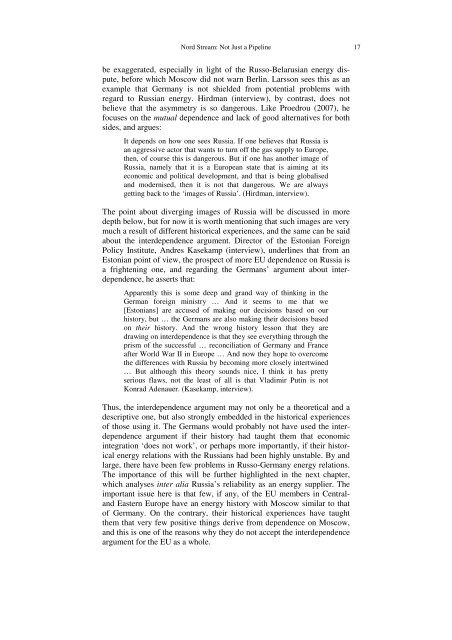Nord Stream: Not Just a Pipeline
Nord Stream: Not Just a Pipeline
Nord Stream: Not Just a Pipeline
Create successful ePaper yourself
Turn your PDF publications into a flip-book with our unique Google optimized e-Paper software.
<strong>Nord</strong> <strong>Stream</strong>: <strong>Not</strong> <strong>Just</strong> a <strong>Pipeline</strong> 17<br />
be exaggerated, especially in light of the Russo-Belarusian energy dispute,<br />
before which Moscow did not warn Berlin. Larsson sees this as an<br />
example that Germany is not shielded from potential problems with<br />
regard to Russian energy. Hirdman (interview), by contrast, does not<br />
believe that the asymmetry is so dangerous. Like Proedrou (2007), he<br />
focuses on the mutual dependence and lack of good alternatives for both<br />
sides, and argues:<br />
It depends on how one sees Russia. If one believes that Russia is<br />
an aggressive actor that wants to turn off the gas supply to Europe,<br />
then, of course this is dangerous. But if one has another image of<br />
Russia, namely that it is a European state that is aiming at its<br />
economic and political development, and that is being globalised<br />
and modernised, then it is not that dangerous. We are always<br />
getting back to the ‘images of Russia’. (Hirdman, interview).<br />
The point about diverging images of Russia will be discussed in more<br />
depth below, but for now it is worth mentioning that such images are very<br />
much a result of different historical experiences, and the same can be said<br />
about the interdependence argument. Director of the Estonian Foreign<br />
Policy Institute, Andres Kasekamp (interview), underlines that from an<br />
Estonian point of view, the prospect of more EU dependence on Russia is<br />
a frightening one, and regarding the Germans’ argument about interdependence,<br />
he asserts that:<br />
Apparently this is some deep and grand way of thinking in the<br />
German foreign ministry … And it seems to me that we<br />
[Estonians] are accused of making our decisions based on our<br />
history, but … the Germans are also making their decisions based<br />
on their history. And the wrong history lesson that they are<br />
drawing on interdependence is that they see everything through the<br />
prism of the successful … reconciliation of Germany and France<br />
after World War II in Europe … And now they hope to overcome<br />
the differences with Russia by becoming more closely intertwined<br />
… But although this theory sounds nice, I think it has pretty<br />
serious flaws, not the least of all is that Vladimir Putin is not<br />
Konrad Adenauer. (Kasekamp, interview).<br />
Thus, the interdependence argument may not only be a theoretical and a<br />
descriptive one, but also strongly embedded in the historical experiences<br />
of those using it. The Germans would probably not have used the interdependence<br />
argument if their history had taught them that economic<br />
integration ‘does not work’, or perhaps more importantly, if their historical<br />
energy relations with the Russians had been highly unstable. By and<br />
large, there have been few problems in Russo-Germany energy relations.<br />
The importance of this will be further highlighted in the next chapter,<br />
which analyses inter alia Russia’s reliability as an energy supplier. The<br />
important issue here is that few, if any, of the EU members in Central-<br />
and Eastern Europe have an energy history with Moscow similar to that<br />
of Germany. On the contrary, their historical experiences have taught<br />
them that very few positive things derive from dependence on Moscow,<br />
and this is one of the reasons why they do not accept the interdependence<br />
argument for the EU as a whole.













